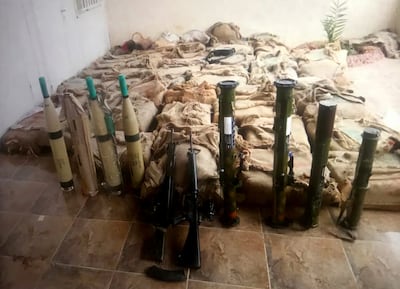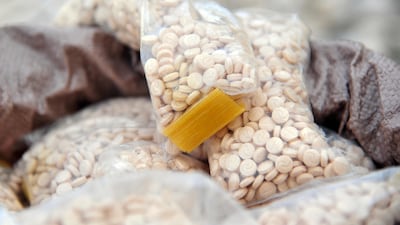Live updates: Follow the latest on Syria
Syria's production of the Captagon drug has come to a near halt since the ousting of Bashar Al Assad's regime, a Jordanian and a European official told The National.
The cross-border flow of the drug has been a prominent national security threat in the Middle East. Billions of dollars a year worth of Captagon have crossed from Syria into other Arab countries through Jordan since 2018.
In 2021, the Syrian government is estimated to have made more than $5 billion from the sale of Captagon.
Dealers often targeted the wealthy cities of the Gulf states, leading to drug busts in Saudi Arabia, the UAE and elsewhere
Cartels linked to the Fourth Armoured Division of the Syrian army and Iranian-backed auxiliaries have enabled its spread. It was a major source of income for the ruling elite in Damascus, and their Hezbollah and other non-state supporters, according to regional security officials.
The flow of drugs was one of the main reasons that Arab countries ended hostilities with Mr Al Assad three years ago and normalised ties with his government, seeking co-operation in combating the smuggling operation.
“It is at least 90 per cent down,” said a European official who toured the border area between Jordan and Syria last week, as Mr Al Assad's rule began to crumble.
The US and other countries contributed hundreds of millions of dollars to electronics and other hardware to improve Jordanian defences on the frontier over the past five years. Although there have been more announcements of Captagon and other drug interceptions, the countermeasures did not curb the smuggling with production increasing and the smugglers becoming more sophisticated.
Over the past week, Syrian militants overran the main Captagon factories in Syrian coastal areas, the central governorate of Homs and Damascus and its outskirts. Members of cartels linked to the former regime and to the Lebanese militant group Hezbollah, have abandoned the production compounds, he said.
“What is left are small, scattered workshops, and small players on the border,” he said.
A Jordanian source corroborated the significant drop in the illicit trade, saying that the disappearance of the Syrian army from the border has robbed the smugglers of cover.
“The Fourth Brigade used to launch smoke bombs to help them infiltrate, and Hezbollah flew surveillance drones,” he said, adding that both actors are no longer present.
The Fourth Brigade also played a significant role in bringing in raw materials from Iraq and Lebanon to the Captagon manufacturing centres in Syria.
An increase in Captagon production started in 2018 after Russian intervention in Syria enabled Mr Al Assad’s forces to recapture most of the country’s south from rebels. Russia intervened in the conflict in late 2015 to prevent the Assad regime from collapsing, after rebels mounted an offensive aimed at capturing Damascus.
Under a Russian-US-Israeli deal, the regime was allowed to retake the south as long as Hezbollah and other pro-Iranian militias kept away from the frontier.

However, the halt in the Captagon flow may not last for long, said Nicholas Krohley, a Middle East security analyst who co-wrote a report on Captagon for XCEPT, an independent organisation focused on border security,
Mr Krohley expects that militias in Iraq aligned with Iran's Islamic Revolutionary Guard Corps to take advantage of the vacuum and start a production “boom”.
“The IRGC needs that revenue, and the Levant is now more or less cut off,” Mr Krohley said. “In Syria, it really depends on what happens politically.”
He said that if militia rule continues in Syria, the Captagon could become a “means to generate revenue, provide services, and compete for influence”, among the new warlords.
“Captagon will be an appealing quick-fix for cash.”
A Captagon pill, often produced at converted medicine factories, costs as little as a few cents to produce but is sold for several dollars in Jordan. The highest quality went to other Arab countries and was sold for as much as $20 a pill.

